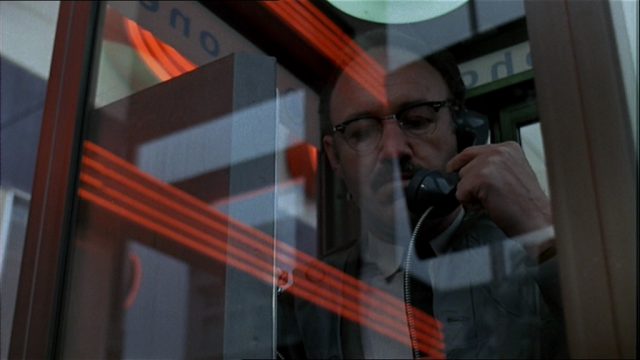For me, art is communication, and all art is inherently in conversation with everything that preceded it. Sometimes that conversation is direct, as is the case with Francis Ford Coppola’s The Conversation and Brian De Palma’s Blow Out, two surveillance-themed films influenced by Michelangelo Antonioni’s Blow-Up. I watched all three in chronological order to see how three different filmmakers approached the basic premise of a man unwittingly capturing evidence of a murder or murder plot, and wow, it’s fascinating how vastly different the films are, despite the clear connections cited by the filmmakers themselve. A languorous slice of life of mod culture in the sixties. A paranoia-tinged character study in the seventies. A stylish conspiracy thriller in the eighties. But for my money, Coppola’s The Conversation is the best of these three heralded classics.
The film opens with the recording of the titular conversation between a man and a woman, and it’s not long before Harry Caul, surveillance tech extraordinaire, isolates the eight words that will haunt him for the rest of the film: “He’d kill us if he got the chance.” This young couple is in danger, and Caul must now decide what to do. A confessional scene reveals that he has gotten people killed before, so he knows it’s possible for his wiretaps to have deadly consequences (De Palma would give his protagonist a similar motivation, minus the religious overtones). But is he responsible for what other people do with the information he provides? Driven by that Catholic guilt — his devotion is so deep he won’t let poor John Cazale take the Lord’s name in vain in his presence — he replays the conversation over and over, fucking obsessed. He must crack the meaning for the sake of these people’s lives and his own conscience.
Coppola conveys Caul’s paranoid tension without flashy camera moves or musical stings. He simply presents the world in such a way that we feel all the different ways people can be listening — and watching, as we’re often the voyeurs watching the action from a distance. Hell, there’s even a motherfucking SURVEILLANCE CON, an event whose very existence should concern you. David Shire’s haunting piano score makes scenes slightly creepy, a musical manifestation of the prickle on the back of your neck; at the same time, it sounds like it’s tiptoeing right to the edge of being beautiful but the repetitive minor keys underscoring the melody are omnipresent, pulling it back.
Shire’s score also evokes the tragedy of Harry Caul, a man who closes himself off to avoid being close. In his line of work, he can never not hear the minor keys; his job reminds him that vulnerability leaves you open to exploitation. He wants to have no secrets, no private possessions, nothing that can be taken from him. And so he can’t even have relationships with his lover, Teri Garr, or his partner, John Cazale, because he won’t let them in. The one time he lets his guard down and has the sort of intimate conversation he studiously avoids, he discovers he was being taped.
It seems like an emasculating moment. I’m not positive whether Coppola intends Caul’s refusal to connect emotionally as a comment on traditional masculinity, but I did notice that it takes a dream for him to reveal any actual personal information about himself to a woman. In addition, despite the fact that one of the eight words he’s obsessed with is “us,” implying that both the man and woman are in danger, he is concerned only about the woman. She’s the one he’s trying to save, not him.
In the third act, Caul begins to lose his grip on reality, but the film still delivers some devastating answers rather than relishing the Antonionian ambiguity. Thus it does work as a neo-noir mystery-thriller, but the plot is less important than its effect on the character. We have been in his POV the entire time, and now we must reckon with the outcome of events and reevaluate everything. Through Caul, Coppola has shown the perils of surveillance and what paranoia can do to you. You should be afraid, but not too afraid, or else you’ll end up in your apartment alone playing a mournful saxophone.


